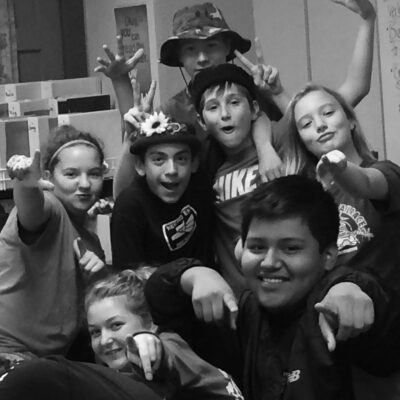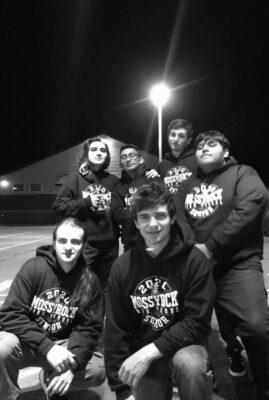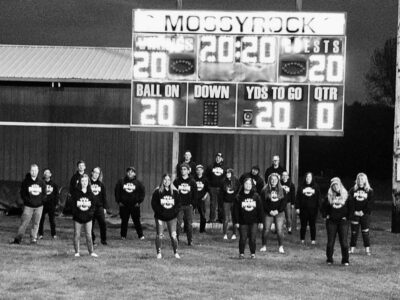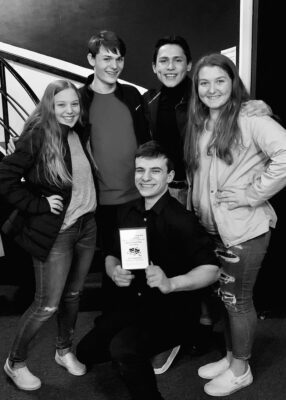My district was one of the first in our region to go back to school face-to face this year. We began a “hybrid model” on September 14, with seniors and K-3 going four days a week, and all others going twice-a-week in cohorts (Monday/Thursday and Tuesday/Friday). On Wednesdays we delivered online material and caught up with our work, while reinventing it simultaneously. Some of our students opted for full-time distance learning, but the vast majority excitedly prepared for the first day of school.
Our neighbor districts were watching us intently. Would we pave the way for others to follow us, or would we cause an outbreak in our tiny town?
One week in, “it” happened. A student, who later tested positive for Covid-19, attended the first day of school. Dozens of staff members and students were subsequently quarantined due to contact with the student, and the decision was made to suspend school until the 14-day quarantine period was over, giving the health department time to do all of the necessary contact tracing. Our schools and buses were disinfected, and our teaching staff pivoted to all online learning, something we were told was likely to happen from the start.
Not an auspicious beginning, you might say. But let me elaborate.
Category Archives: High School
One Last Lesson: Mindfulness in Trying Times
I cannot begin to tell you how special my 2020 seniors are to me. I feel like writing them a mass letter of recommendation, pinning the hopes of the world on their amazing shoulders. They are the inspiration I need these days, because their cleverness, their resilience, their awareness, and their kindness are what we need to solve problems and hold each other up.
Last week I had one more online class with them to plan, and I had to make it matter. They have been my students since seventh grade. They’ve heard all my stories; they know all my opinions. I’ve presented them with hundreds of lessons on literature and composition. If I haven’t taught them a skill by now, it really is too late, right?

2020 Mossyrock Seniors in Junior High
Bell to bell. I like to fill my students’ time with learning, which makes me an exhausting, high-energy, way-too-intense teacher for some folks, but they know to expect my expectations. And we were going to learn on the last day, too.
What was the lesson they still needed? We had dedicated most of the last semester of their dual-credit composition class to “skills for success”. We brainstormed what successful adults had learned – outside of school. We compared that to their collective knowledge, and then they dug into some research to create projects to share with their peers to expand their knowledge in the homestretch. They created research papers, multimedia presentations, and blog posts (see them here), as individuals and groups. It was relevant, dynamic, timely, and successful. And, in the middle of it, the pandemic happened.

Some of the Girls (Photo Credit: Amy Fitzhugh)
So what was the lesson I still owed them? It is one I am working on myself, and one we all need, especially with the isolation and the unfamiliar challenges of distance learning. I announced that I (their least relaxed teacher of all time) was delving into mindfulness techniques to manage stress in these strange times. I have been reading about stress and mental health all year, and I had just attended our CSTP Happy Hour that focused on mindfulness with special guest Christy Anana. All of the signs led to this topic. This topic chose itself.
I let my vulnerability show, telling my seniors I knew my mindfulness skills were awful, and my “vibe” was not the sort that a mindfulness teacher would have, but I also knew that it was a skill for success that we had bypassed in our research. It was too important to leave out.

Some of the Boys (Photo Credit: Sage Pereira)
So, we watched some videos: an explainer on stress and the brain; some videos of a high school teacher who helps her students “arrive” through mindfulness; and a video that led us through a mindful minute. We discussed how we felt about it, how our conservative community would react if teachers started teaching mindfulness regularly, and how we could use it in our lives to stay grounded and present.
And, as usual, like every other time, these kids impressed me. They were amazing, and already better than me at mindfulness.

The Home Team (Photo Credit: Amy Fitzhugh)
So, at the end, I gave them instructions as to how to write their final reflection and submit their portfolios. There was an awkward pause. I struggled to find some witty way to say my final goodbye, and I failed.
I just said, “I’m going to let you go.”
Pause. Long pause.
“Are you going to cry Mrs. Olmos?”
“Yes.”
That was the last lesson, the last gift I had to give those students. But, next year’s students, no matter what next year looks like, are going to get a more mindful teacher from the get-go.

One More for the Road (Photo Credit: Amy Fitzhugh)
Resources:
How Our Brains React to Uncontrollable Stress
Harvard Researchers Study How Mindfulness May Change the Brain in Depressed Patients
The Sexual Health Education Bill: Facts to Calm the Fear

By Guest Contributor Shannon Cotton, NBCT
Senate Bill 5395, known as the comprehensive sexual health bill, was a hot topic in Olympia this Legislative session. A few weeks ago I spent 90 minutes watching TVW listening to the state senators make comments about the amendments before a roll call vote which passed the bill 27 to 21.
Legislators talked about constituents who felt as if “government isn’t listening to what they want.” For every parent who wants to exercise their rights to control the sexual health education of their child another family desperately wants their children to have access to health-enhancing information. Shouldn’t our public school system make information accessible to all as long as provisions are made to allow a family to opt out if they wish?
As a National Board Certified health teacher with 16 years experience teaching sexual health to middle school students in Washington state, I have been fielding questions and attempting to help others understand what this bill means to student learning and overall student health. I have spent more hours than I care to admit trying to clear up misconceptions and disprove outrageous propaganda created to spark fear into parents on social media with information that are outright lies.
Here are some facts about ESSB 5395:
Continue reading